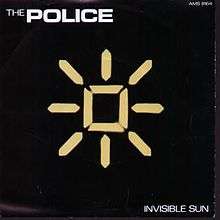Invisible Sun
| "Invisible Sun" | ||||||||||
|---|---|---|---|---|---|---|---|---|---|---|
 | ||||||||||
| Single by The Police | ||||||||||
| from the album Ghost in the Machine | ||||||||||
| B-side | "Shambelle" | |||||||||
| Released | September 1981 | |||||||||
| Format | Vinyl record (7") | |||||||||
| Recorded | 1981 | |||||||||
| Genre | New wave | |||||||||
| Length | 3:44 | |||||||||
| Label | A&M – AMS 8164 | |||||||||
| Writer(s) | Sting | |||||||||
| Producer(s) | ||||||||||
| Certification | Silver (BPI) | |||||||||
| The Police singles chronology | ||||||||||
| ||||||||||
"Invisible Sun" is a hit single by rock group The Police, released in September 1981.[1] It was the first single to be released in the United Kingdom from the album Ghost in the Machine and it reached number 2 in the charts.[2] In most other territories, "Every Little Thing She Does Is Magic" was chosen as the lead single from the LP.
Background
Sting wrote "Invisible Sun" as a message to the Irish while visiting there.
"I actually wrote the song in Ireland, where I was living at the time. It was during the hunger strikes in Belfast. I wanted to write about that but I wanted to show some light at the end of the tunnel. I do think there has to be an 'invisible sun'. You can't always see it, but there has to be something radiating light into our lives."[3]— Sting, Revolver, 2000
The song's lyrics stem from songwriter Sting's pondering how people living in war-torn and/or impoverished countries find the will to go on living, and despite the dark music and often morbid lyrical statements, the song carries an intensely uplifting and optimistic message. The song was deeply personal for drummer Stewart Copeland, whose hometown of Beirut was being heavily bombed at the time of the song's recording.[3]
"For me, the song was about Beirut, where I'd grown up, which at that point was going up in flames. My hometown was being vilified by the media as a terrorist stronghold, and it was being blasted by bombs and napalm. Twenty thousand Lebanese were killed that year. And the Lebanese must have been feeling some heat from the invisible sun, because they were keeping their peckers up."— Stewart Copeland, Revolver, 2000
Bono from rock group U2 performed duets of it with Sting when U2 and The Police appeared at the same concerts: the first such instance was in 1982 at a festival in Gateshead, England, and two subsequent instances occurred at the last two shows of Amnesty International's A Conspiracy of Hope Tour in 1986.[4]
The song is a departure from Police songs before it; "Invisible Sun" contains a dark, looping synthesizer beat, and powerful, haunting lyrics. Among other things, the lyrics refer to the ArmaLite rifle used by paramilitary organisations, but mainly by the Provisional Irish Republican Army.[5] The music video for "Invisible Sun" features a collection of video clips taken from the conflict in Northern Ireland. Due to its subject matter, it was banned by the BBC.[3] "Invisible Sun" was also used as the opening music to the BBC 'Play for Today' film The Long March (1981), written by Belfast writer Anne Devlin.
Composition
"Invisible Sun" is composed in the key of E-flat major/C minor with the verses alternating between these keys. The verses give off an ominous and desperate feeling. The chorus is in G major and is heavier and more bombastic.[6]
Personnel
- Sting – bass guitar, keyboards, lead and backing vocals
- Andy Summers – guitars, effects
- Stewart Copeland – drums
Track listing
- 7": A&M / AMS 8164 (UK)
- "Invisible Sun" – 3:35
- "Shambelle" – 5:42
- 7": A&M / AMS 8164 (NL)
- "Invisible Sun" – 3:35
- "Flexible Strategies" – 3:42
Covers
- Northern Irish rock band Therapy? recorded a cover of the song in 1993.
- The Swedish progressive death metal act Edge of Sanity covered the song on their 1995 LP Until Eternity Ends.
- Champaign, IL band Hum covered the song in concert on more than one occasion.
- Sting collaborated with Aswad on a reggae version of this song for the X-Files in 1998.
- In February 2000, the Foo Fighters recorded a cover of the song to be used as a B-side on one of the then-upcoming singles for There Is Nothing Left to Lose, but the song was not used as planned.
See also
References
- ↑ Sutcliffe, Phil (1993). "A Police Discography". In Message in a Box: The Complete Recordings (pp.60–61) [Boxed set booklet]. A&M Records Ltd.
- ↑ UK Singles Charts for the week of 3 October 1981, The Official Charts.
- 1 2 3 Garbarini, Vic (Spring 2000). "I think if we came back...", Revolver.
- ↑ U2 Tour History: Invisible Sun, U2gigs.com.
- ↑ Boyne, Sean (24 October 2001). "Analysing the IRA's historic decommissioning move". Jane's Information Group. Archived from the original on 8 December 2004. Retrieved 6 July 2008.
- ↑ "The Police "Invisible Sun" Sheet Music in Eb Major (transposable) - Download & Print - SKU: MN0068318". Musicnotes.com. 2008-10-13. Retrieved 2016-10-19.
.jpg)